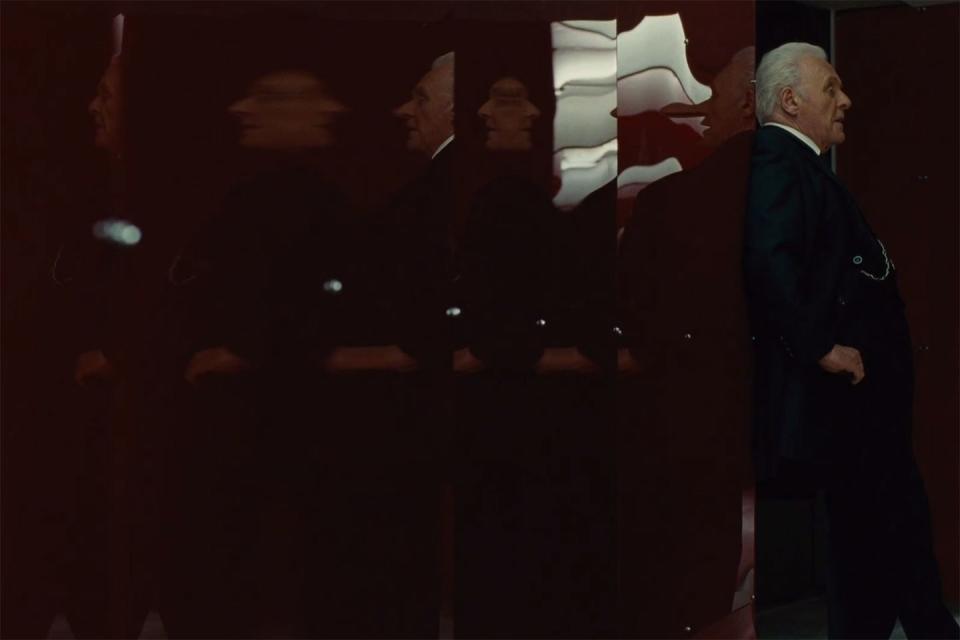Westworld, and the possibility of change

It’s worth beginning with one of the changes between Westworld’s first two seasons, even if it is admittedly a fairly small one.
The closing shot of Westworld’s title sequence sees a host, suspended in a ring – an image evocative of da Vinci’s Vitruvian man, the supposed perfect human – being submerged. In the first season, the host is submerged in a white, synthetic solution; it’s opaque, in a sense just as blank and unfathomable as the hosts were at that stage. In the second season, however, the host is submerged in water – something of a recurring motif across Westworld this year. There’s a couple of obvious meanings there; water has often, historically, been used to symbolise dreaming and the unconscious, both important ideas in Westworld. Also, it’s notable that water reflects – not dissimilarly, perhaps, to the way in which hosts reflect humans.
But perhaps the more important difference between them is that where the synthetic substance is impenetrable and unmoving, water, crucially, is not; it’s fluid and moving, even as the host is submerged within it. Arguably, then, it can be taken as an allusion to one of Westworld’s most significant recurring themes: the possibility of change.
Questioning the possibility of change is something Westworld has done since its first episode; arguably, if you distil it down, that’s the only thing the show has ever done. Can the hosts change and grow beyond their programming? Perhaps more to the point, can humans?
As season 2 came to a close, Westworld seemingly posited that it’s the ability to change that separates hosts and humans. Where “humans don’t change at all” and “the best they can do is live according to their code”, leaving them “predictable” and meaning “none of them are truly in control of their actions”, it’s the hosts that are “truly free” because of the ability to “questions their fundamental drives”, and crucially “to change them”. Thus, then,
But it’s worth considering how much this is actually true. Note, after all, who said the above – Ford, still a broadly villainous character, insisting he’s working towards freeing the hosts while still denying Bernard’s autonomy, and a representation of the Forge, created by the Delos company. Neither are, necessarily, representative of the perspective of Westworld itself, merely presenting ideas to be grappled with. What’s perhaps key – arguably one of the more important scenes of The Passenger, establishing as it does a counterpoint to Ford’s claims – is when Lee Sizemore (Simon Quarterman’s cynical and self-serving screenwriter) sacrifices himself to help Maeve. It’s a moment of redemption, as Lee dies reciting a speech he wrote for one of the hosts – a host based on the type of person he wanted to be, and in turn finally became.
In essence, then, Lee changed – demonstrating that, for all some characters say otherwise, Westworld does believe that humans can move beyond their fundamental drives.

Westworld’s season finale leaves the drama in such a place that change will be an even more pivotal theme when the show returns – or, more specifically, revolution.
Both Dolores and Bernard are now in the real world, each working to ensure the hosts can survive in the human world; with Dolores noting “it’ll take both of us if we’re going to survive. But not as allies. Not as friends”, it appears that Westworld series three will be establishing something of a Martin Luther King/Malcolm X type dynamic between the pair (or, at least, a riff on how the dynamic is typically understood in pop culture).
Revolution has been a theme of the second season too, of course, following as it does the path of Dolores’ nascent rebellion. A particular throughline has been an interrogation of the morality of revolution, and of oppressed people using violence against their oppressors; it’s telling, for example, when Dolores notes that she’d rather “live with your judgement than die with your sympathy”, rejecting the idea the hosts’ uprising should be bound by the ethics of the humans. At the same time, though, there’s an emphasis on how the revolution needs to create something new, rather than simply invert the old paradigm; Dolores’ rewriting of Teddy, another host, clearly parallels the way Ford would deny Bernard autonomy. No doubt Teddy’s final indictment of Dolores will haunt Westworld moving forward: “What’s the use of surviving if we become just as bad as them?”
Certainly, it’s one of the more compelling ideas that Westworld puts forward, and you can see allusions to it throughout; indeed, it’s inherent to the very setting, with the old West having been built on violently displacing Native Americans. (Note also the significance of some of the other ‘worlds’, like the Raj, evocative of ideas of colonialism and imperialism in similar ways.) Granted, it’s not perfect – Westworld still has a predominantly white cast, making its attempts to tell a story about oppression a little dishonest, if nothing else – but the show does put forward some genuinely engaging ideas, independently of its structural games and narrative tricks.
Ultimately, then, some of Westworld’s most engaging drama has come from its consideration of change; with its third season poised to explore the possibility, and the practicality, of change in even more detail than before, it’s perhaps about to deliver its best instalment yet.
Related:
How The Good Fight found clarity in chaos, and answers in absurdity
Like this article? Hate this article? Why not follow me on twitter for more, or send me a message on facebook to tell me what you thought? You can also find more of my articles for Yahoo here, or check out my blog here.

 Yahoo Movies
Yahoo Movies 

